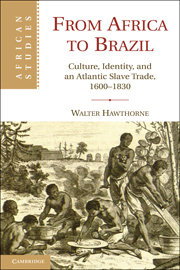Book contents
- Frontmatter
- Contents
- List of Figures
- List of Maps
- List of Tables
- Abbreviations Used in Notes
- Acknowledgments
- Introduction
- PART I THE WHY AND HOW OF ENSLAVEMENT AND TRANSPORTATION
- PART II CULTURAL CHANGE AND CONTINUITY
- 4 Labor over “Brown” Rice
- 5 Violence, Sex, and the Family
- 6 Spiritual Beliefs
- Conclusion
- Index
- References
5 - Violence, Sex, and the Family
Published online by Cambridge University Press: 05 September 2012
- Frontmatter
- Contents
- List of Figures
- List of Maps
- List of Tables
- Abbreviations Used in Notes
- Acknowledgments
- Introduction
- PART I THE WHY AND HOW OF ENSLAVEMENT AND TRANSPORTATION
- PART II CULTURAL CHANGE AND CONTINUITY
- 4 Labor over “Brown” Rice
- 5 Violence, Sex, and the Family
- 6 Spiritual Beliefs
- Conclusion
- Index
- References
Summary
In 1799, a white woman living in Maranhão named Maria de Bairros complained in divorce proceedings that her husband, Antonio de Bairros, “regularly raped and violated his female slaves and those of others.” She also claimed that for “years he has lived publicly and scandalously with a concubine who is his slave and is called Jeronima.” Maria made mention, as well, of another slave with whom Antonio had had a sexual relationship – Barbara. Called before a priest, Antonio confessed to the sins of which his wife had spoken. However, in the heat of the divorce proceedings, he turned the tables on Maria, recounting how jealousy had driven her to commit a horrendous act. Antonio said that Maria became so enraged at his escapades, and particularly those with his favorite black concubine, that she took an iron poker and heated it in fire before “burning the private parts of his slave named Barbara, martyring her and leaving her in a miserable state.” A short while later and “to escape justice, it was necessary to sell the slave out of the district.” Neither Antonio nor Maria would have to pay an earthly penalty beyond a small fine for the torture and subsequent sale of Barbara.
This heart-wrenching account is recorded alongside notes about other episodes in the lives of slave women and men in Church books of divorce and denunciation found in Maranhão’s state archive. Most of the slaves mentioned in those books were from the Upper Guinea region of Africa or were the crioulo (Afro-Brazilian) descendants of Upper Guineans. Taken together, entries in Church records show that people of color were incredibly constrained by complex gendered and racial hierarchies in Maranhão. In this racist and patriarchal society, the state rarely intervened in matters concerning white masters and their slaves. White power over people of color, and especially slaves, was immense. It was so in Maranhão’s frontier period – which stretched from the early seventeenth through the mid-eighteenth centuries, when Indian slaves were the captaincy’s principal workers and economic production was very limited. And it was so in Maranhão’s plantation period – which began after the mid-eighteenth century, when Portuguese policy makers encouraged the importation of large numbers of African slave laborers, and rice and cotton exports rose dramatically.
- Type
- Chapter
- Information
- From Africa to BrazilCulture, Identity, and an Atlantic Slave Trade, 1600–1830, pp. 173 - 207Publisher: Cambridge University PressPrint publication year: 2010

